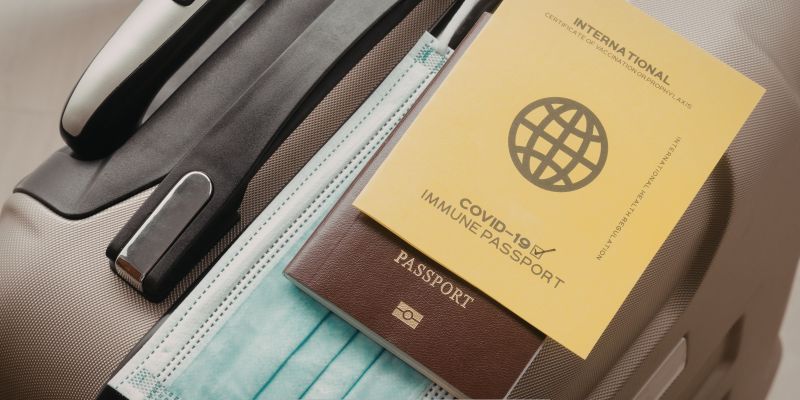In recent years, the world has witnessed a significant shift in how public health measures are approached, particularly in the wake of the COVID-19 pandemic. One of the most notable developments has been the implementation of vaccine passports, which have emerged as a tool to facilitate safe travel and access to various public spaces. As countries grapple with the challenges posed by the pandemic, vaccine passports have become a focal point in discussions about public health, individual rights, and the future of global mobility.
The introduction of these digital or physical documents aims to provide proof of vaccination status, thereby allowing individuals to navigate a post-pandemic world with greater ease and confidence. The implementation of vaccine passports has sparked a myriad of debates and discussions among policymakers, health experts, and the general public. While some view them as a necessary step towards normalcy, others raise concerns about equity, privacy, and the potential for discrimination.
As nations begin to adopt these systems, understanding their implications becomes crucial for both individuals and society as a whole. This article delves into the intricacies of vaccine passports, exploring their definition, advantages and disadvantages, technological underpinnings, and the broader impact on travel and public health.
Key Takeaways
- Vaccine passports are being implemented as a way to safely reopen travel and public spaces during the COVID-19 pandemic.
- A vaccine passport is a digital or physical document that provides proof of an individual’s vaccination status against COVID-19.
- The pros of vaccine passports include enabling safer travel and reopening of economies, while the cons include potential discrimination and privacy concerns.
- Vaccine passports will impact travel by potentially becoming a requirement for international and domestic travel, and may lead to changes in travel protocols and restrictions.
- The technology behind vaccine passports includes digital platforms and apps that securely store and verify vaccination records.
What is a Vaccine Passport?
Facilitating Safer Interactions and Travel
The primary purpose of a vaccine passport is to facilitate safer interactions in public spaces and enable travel across borders by confirming that individuals have received the necessary vaccinations.
A Concept with a Long History
The concept of vaccine passports is not entirely new; similar systems have existed for decades in the form of yellow fever vaccination cards required for entry into certain countries.
Standardization and International Recognition
However, the COVID-19 pandemic has accelerated the development and adoption of these passports on a much larger scale. Countries and organizations are now working to create standardized systems that can be recognized internationally, ensuring that individuals can easily demonstrate their vaccination status regardless of where they are traveling.
The Pros and Cons of Vaccine Passports

The implementation of vaccine passports comes with a range of advantages that can significantly enhance public health efforts and facilitate safer travel. One of the most compelling benefits is the potential to reduce the spread of infectious diseases. By requiring proof of vaccination for entry into certain venues or countries, vaccine passports can help create safer environments for individuals and communities alike.
This is particularly important in settings such as airports, concerts, and sporting events, where large gatherings pose a heightened risk for virus transmission. However, alongside these benefits are notable drawbacks that warrant careful consideration. One major concern is the potential for inequity in access to vaccines.
Not everyone has had equal opportunities to receive vaccinations due to factors such as socioeconomic status, geographic location, or systemic barriers within healthcare systems. This raises ethical questions about whether it is fair to restrict access to certain activities or locations based on vaccination status. Additionally, there are concerns about the potential for discrimination against those who cannot or choose not to get vaccinated for medical or personal reasons.
How Vaccine Passports Will Impact Travel
| Aspect | Impact |
|---|---|
| International Travel | May require proof of vaccination for entry |
| Tourism Industry | Could see a boost as vaccinated travelers feel more confident to travel |
| Health Safety | May help prevent the spread of COVID-19 in travel destinations |
| Privacy Concerns | Could arise due to sharing personal health information for travel |
The impact of vaccine passports on travel is expected to be profound as countries seek to revive their tourism industries while ensuring public safety. With many nations having implemented strict travel restrictions during the pandemic, vaccine passports offer a pathway to reopening borders and restoring confidence among travelers. By providing proof of vaccination, these passports can streamline the entry process at airports and border crossings, reducing wait times and enhancing overall travel experiences.
Moreover, vaccine passports may encourage more people to get vaccinated, knowing that doing so could facilitate their ability to travel freely. This could lead to increased vaccination rates globally, contributing to herd immunity and ultimately helping to control the spread of infectious diseases. However, it is essential for governments and health organizations to ensure that these systems are implemented fairly and equitably so that all individuals have access to the benefits they provide.
The Technology Behind Vaccine Passports
The technology supporting vaccine passports is diverse and rapidly evolving. Many countries are adopting digital solutions that utilize secure applications or blockchain technology to store and verify vaccination records. These digital passports can be easily accessed via smartphones, allowing users to present their vaccination status quickly when required.
The use of encryption and secure data storage methods helps protect sensitive personal information while ensuring that verification processes are efficient. In addition to mobile applications, some countries are also exploring partnerships with existing health systems and organizations to create interoperable solutions that can be recognized globally. This means that a vaccine passport issued in one country could be verified in another, facilitating international travel and cooperation in public health efforts.
As technology continues to advance, it is likely that vaccine passport systems will become even more sophisticated, incorporating features such as biometric identification for added security.
Challenges and Concerns with Vaccine Passport Implementation

Standardization: A Key Challenge
One significant challenge is achieving international consensus on what constitutes an acceptable vaccine passport. Different countries may have varying requirements regarding which vaccines are recognized or how vaccination records are verified. This lack of standardization could lead to confusion among travelers and hinder the effectiveness of vaccine passports as a global tool.
Fraud and Misuse: A Risk to Be Mitigated
Another concern revolves around the potential for fraud or misuse of vaccine passports. As with any system that requires documentation, there is a risk that individuals may attempt to falsify their vaccination status to gain access to certain privileges or locations.
Robust Verification Processes: The Solution
Governments and health organizations must implement robust verification processes to mitigate this risk while ensuring that legitimate users can easily access their vaccination records without unnecessary barriers.
The Role of Governments and Health Organizations in Vaccine Passport Implementation
Governments and health organizations play a crucial role in the successful implementation of vaccine passports. Their responsibilities include establishing clear guidelines for what constitutes a valid passport, ensuring equitable access to vaccines, and developing secure systems for storing and verifying vaccination records. Collaboration between governments at various levels—local, national, and international—is essential for creating a cohesive approach that addresses public health needs while respecting individual rights.
Furthermore, health organizations such as the World Health Organization (WHO) are instrumental in providing guidance on best practices for vaccine passport implementation. They can help facilitate discussions among countries regarding standardization and interoperability while promoting transparency in how vaccination data is collected and used. By working together, governments and health organizations can build public trust in vaccine passport systems and ensure that they serve their intended purpose effectively.
Privacy and Security Issues with Vaccine Passports
As with any system that involves personal health information, privacy and security issues surrounding vaccine passports are paramount. Individuals may be understandably concerned about how their vaccination data will be stored, who will have access to it, and how it will be used beyond its intended purpose. Ensuring robust data protection measures is essential to maintain public trust in these systems.
Governments must establish clear regulations regarding data privacy and security when implementing vaccine passport systems. This includes defining who can access vaccination records, how long data will be retained, and what measures will be taken to prevent unauthorized access or breaches. Transparency in these processes will be critical in alleviating public concerns about privacy while ensuring that vaccine passports can function effectively as tools for public health.
The Global Impact of Vaccine Passport Implementation
The global impact of vaccine passport implementation extends beyond individual countries; it has the potential to reshape international relations and global health strategies. As nations adopt these systems, they may find themselves navigating complex diplomatic landscapes as they negotiate mutual recognition of each other’s vaccine passports. This could lead to new agreements on travel protocols and public health measures that prioritize safety while fostering economic recovery.
Moreover, the widespread adoption of vaccine passports could influence global vaccination campaigns by encouraging countries with lower vaccination rates to ramp up their efforts. As nations recognize the economic benefits associated with reopening borders and revitalizing tourism industries, there may be increased pressure to ensure equitable access to vaccines worldwide. This could ultimately contribute to a more coordinated global response to future pandemics.
How Vaccine Passports Will Shape the Future of Travel
The future of travel is likely to be significantly shaped by the implementation of vaccine passports. As travelers become accustomed to presenting proof of vaccination as part of their journey, it may become a standard requirement for various modes of transportation—airlines, trains, and even local transit systems may adopt similar protocols. This shift could lead to more streamlined travel experiences but also necessitate ongoing discussions about accessibility for those who cannot or choose not to get vaccinated.
Additionally, the rise of vaccine passports may prompt innovations in travel technology and services aimed at enhancing safety and convenience for travelers. For instance, airlines may develop integrated systems that allow passengers to upload their vaccination records directly during booking or check-in processes. Such advancements could further transform how individuals approach travel in a post-pandemic world.
The Way Forward for Vaccine Passport Implementation
As societies continue to navigate the complexities introduced by the COVID-19 pandemic, vaccine passport implementation represents both an opportunity and a challenge. While these systems hold promise for facilitating safer travel and public interactions, careful consideration must be given to issues such as equity, privacy, and security. The role of governments and health organizations will be pivotal in establishing frameworks that promote public trust while ensuring effective public health outcomes.
Moving forward, it will be essential for stakeholders at all levels—governments, health organizations, technology providers, and the public—to engage in open dialogue about the implications of vaccine passports. By addressing concerns collaboratively and transparently, societies can work towards creating systems that not only enhance safety but also uphold individual rights and promote equitable access to vaccines worldwide. Ultimately, the successful implementation of vaccine passports could pave the way for a more resilient global community prepared to face future health challenges together.
FAQs
What is a vaccine passport?
A vaccine passport is a digital or physical document that provides proof of an individual’s vaccination status against certain diseases, such as COVID-19. It may also include other health information, such as recent test results or immunity status.
How does a vaccine passport work?
A vaccine passport typically contains a QR code or other secure identifier that can be scanned or verified to confirm an individual’s vaccination status. This information can be used to grant access to certain locations, events, or travel.
Are vaccine passports mandatory?
The use of vaccine passports is not mandatory in all countries or for all activities. However, some governments and businesses have implemented vaccine passport requirements for travel, entry to certain venues, or participation in events.
What are the benefits of a vaccine passport?
Vaccine passports can help facilitate safe travel and access to public spaces by providing a standardized way to verify an individual’s vaccination status. They may also contribute to the containment of infectious diseases by reducing the risk of transmission in high-traffic areas.
What are the concerns about vaccine passports?
Some concerns about vaccine passports include issues related to privacy, data security, and potential discrimination against individuals who are unable to be vaccinated for medical or other reasons. There are also concerns about the potential for fraud or counterfeit vaccine passports.
Are there international standards for vaccine passports?
As of now, there are no universally recognized international standards for vaccine passports. Different countries and organizations may have their own requirements and systems for verifying vaccination status. Efforts are underway to establish common standards for interoperability and data security.









